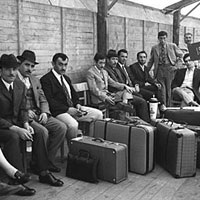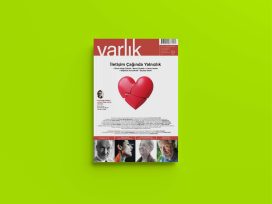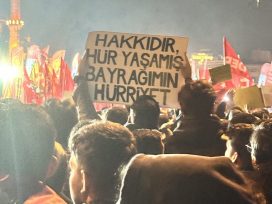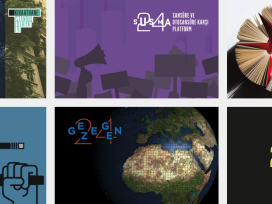 On 31 October it will be 50 years since the signing of the so-called Recruitment Agreement between Turkey and Germany, which paved the way for a massive stream of migrant workers from Turkey thus sustaining the German “economic miracle”. The anniversary provides a good occasion for examining this process in detail, especially in the light of the endless European debates on integration, non-integration, foreigners and otherness, particularly in Germany.
On 31 October it will be 50 years since the signing of the so-called Recruitment Agreement between Turkey and Germany, which paved the way for a massive stream of migrant workers from Turkey thus sustaining the German “economic miracle”. The anniversary provides a good occasion for examining this process in detail, especially in the light of the endless European debates on integration, non-integration, foreigners and otherness, particularly in Germany.
I have been a witness to this development from day one. I was not among those sent as a result of the Recruitment Agreement, but came to Germany as a student. However, I was very much aware of my social responsibility and, as a young writer who believed that people’s place in society lies at the heart of literature, I took part in the process directly, keeping a chronicle of the people who were exposed to the process. As a sufferer of the process I had acquired something new – this is what writer colleagues who came to Germany later told me. I had acquired two countries, two societies, two histories, and two languages. I had the ability to portray the individual from that person’s own perspective.
Stages of the process
Based on personal observations and experiences, I would suggest that the development in the last fifty years has gone through various stages. First came the years of good will and acceptance (between 1961 and 1973), which ended with the law to stop worker migration (Anwerbestopp) and the rotation-integration debate (between 1973 and 1981). Then came the years of stability and commitment to integration (1981 and 1990), which again ended after the unification of Germany. Following the years of exclusion (between 1990 and 2000) there came the renewed integration debates (between 2001-2011).
The first migrant workers, mostly healthy young men, were received with grand welcoming ceremonies at the train stations of Munich, Stuttgart, Cologne and other major cities and were brought to their workplaces and housing facilities. Needless to say, they didn’t have the faintest idea about work and life Germany, its rules and laws, and its everyday culture. Nor did they speak a word of German. Before they came, there were hardly any Turks in Germany; a few hundred students, some diplomats and businessmen, and a handful of adventurers. Though it is a cliché, it is true that they came from an agricultural area dominated by ox plows, arriving at the industrial heart of Germany without so much as a stopover in the western provinces of Turkey. And they came with their wooden suitcases, the trademark of the migrant worker.
The train from Sirkeci to Munich and other German cities took two or three days. This was a journey where people from all around Anatolia met, established friendships and shared meals. Most relationships ended at the final destination station, in only a few cases did the shared nostalgia continue to be expressed via the exchange of letters.
The train station was the migrant workers’ first port of call in Germany, where they encountered the new country for the first time. In the first years, the train station served as a meeting point, where they came together on weekends, sharing their impressions, enjoying each other’s company. This was also a location where one could feel a connection to home, far away, through the tracks of the railroad. The stations were used as a substitute for a social infrastructure that did not yet exist. With the establishment of tea- and coffee houses, restaurants, cultural centres, local associations and mosques, they lost their importance.
At first, Germans were curiously interested in the new arrivals from Anatolia; as the line in Faust went, they were “foreign people” from “Turkey, far away”. However, that also meant that they were “the others” and, as illustrated by the title of an editorial in Frankfurter Allgemeine Zeitung in 1982 (“Fremde und Allzufremde”), they could easily become “too foreign” in times of economic stagnation.
The first arrivals came with employment contracts signed while they were still in Turkey. The young and healthy workers easily adapted to the new way of life and working conditions. When their contracts expired after one or two years, employers and trade unions did not want to send them back. They were hardworking and adaptable labourers with no other expectations than a job and a livelihood; thus, they were humble, respectful, simple and modest. They even learned to speak some German, and used the local language in their daily lives.
Employers and businesses were very fond of Turkish workers, and as the need for manpower grew they kept requesting more. It was not a problem to send these workers back during the short recession of 1966-67: knowing that the need for migrant workers would re-emerge, employers promised to summon them when things improved – and they kept their promise.
The first generation was willing to adapt; in fact, more so than the German employers and authorities, who weren’t at all prepared to provide good living conditions for the newcomers or meet their daily needs. Only after quite some time did the German institutions come up with the idea of employing interpreters, starting with banks and other companies that were interested in the money the migrant workers were making.
The women’s revolution
After the short recession of 1966-67, German companies began to commission Turkish women for work in precision industries such as electronic and textile companies. Not only were the wages paid to women lower, but women’s hands were also better suited to these tasks.
Combined with the desire of so many Turks to work in Germany, this caused a profound, almost revolutionary change in Turkish society. Husbands, fathers and brothers now had the opportunity to go to Germany thanks to their wives, daughters and sisters. Having been employed for one year in Germany, female workers could arrange to have their husbands, fathers and even brothers join them. Men who were formerly reluctant to let women out of the house without male company now acquiesced to them travelling all the way to Germany. The concern about chastity was buried deep in the patriarchal mind.
The arrival of female workers changed the perception of German society as well: the “male Turk” image was altered and German companies were very pleased with their female workers, which meant that negative reactions in the rest of society remained at a minimum.
The ban: Anwerbestopp
The German economic miracle was already on the decline when recession struck in 1973, triggered by the global oil crisis. With unemployment rising, the German parliament passed a law banning the recruitment of migrant workers, the so-called Anwerbestopp. This was above all intended to prevent the influx of further immigration from Turkey. The autumn of 1973 was a turning point, as Turkish workers in Germany began to convert their temporary residence permits to permanent permits. The military coup of 12 March 1971 had jeopardized the hopes of a better life in Turkey. As a result, the Turks in Germany increasingly made use of the right written into the German constitution to family reunion, bringing their spouses and children from Turkey.
During the short economic crisis in 1966-67, negative reactions within German society towards the Turks had started to appear; the longer crisis of 1973-74 exacerbated this. Not wanting to take responsibility for unemployment, the administration blamed Turkish workers, leading to hate speech and public demonstrations, exemplified by the slogan “Türken raus!” (Turks, go home!)
Meanwhile, in political circles, the rotation-integration debate grew increasingly venomous. Rotation meant that politicians and companies could easily dispense with unemployed Turks: go back to your country; we will call you if we need you. This campaign was led by the former-Nazi president of Baden-Württemberg, Hans Filbinger.
I have said the same thing since the beginning: the debate over rotation or integration was nothing but demagogy and polemics. No one can force people who have lived permanently and worked legally in a country for so many years to leave. This debate was used to distract voters from the more pressing issues. The call for integration was nothing more than a hollow slogan.
Asylum for work
As the 1973-74 crisis subsided, workers were again needed in several sectors, including the automobile and entertainment industries. The domestic market could not keep up with the demand, but labour migration was still banned by law. Trade unions objected to any changes to this law and the politicians who had instrumentalized the migrant worker issue during the crisis did not want to go into reverse.
The way to get around this was asylum: people now started to come from Turkey on tourist visas, applying for asylum when in Germany. Some lawyers specialized in such cases, waiting for their Turkish clients with reams of asylum petitions in their offices. An interpreter, hired for at least 500 marks, filled out the application and the lawyer submitted it to the authorities. As long as the petition was being processed, the applicant was allowed to work in any job he or she could find. Already settled Turks also utilized this method to bring over their relatives and friends from Turkey.
Visa requirements and the reunification of Germany
In 1981 another recession struck. Asylum was a constitutional right that could not be banned and processing an application took at least a year. This required an alternative preventive measure. The solution was to abolish work permits for asylum applicants. Now applicants could not work while waiting for the outcome. In addition, visa requirements were introduced for Turkish citizens. Furthermore, those who wanted to return to Turkey permanently could now receive the worker-paid portion of their retirement plans in full. According to the chancellor Helmut Kohl, “a significant number of Turks had to go back”.
In the mid-1980s, a new period of stability and mutual acceptance began for those Turks who had remained in Germany. However, with the fall of the Berlin Wall and the reunification of Germany on 3 October 1990, this period of stability came to an abrupt end. Overnight, political and economic attention shifted to eastern Germany and other countries in central and eastern Europe. Unification was complete in terms of international law; now, the much more difficult and expensive economic, social and cultural integration had to take place.
In the process, the coexistence of Turks and Germans was forgotten. Meanwhile, racist groups enjoyed a new freedom: towns like Mölln, Solingen, Hoyerswerda and Rostock became hubs for racist activity. The younger generation – born, raised and institutionally socialized in Germany – began to feel that they were not accepted as part of society. They began to look for new identities, since their German one was not approved.
The integration debate revisited
From 2000 onwards, migration was back on the political agenda. New immigration laws mostly ignore immigrants’ needs. The exclusion in the 1990s has led to a visible division in society: a lack of proper schooling and vocational training in combination with the rise of fundamentalist religious circles have left clear traces clear on the streets and in relationships. Meanwhile, German politicians are again pressing for the adoption of a “primary culture”. “Adapt or leave!” – the theses of Thilo Sarrazin are just a further example.
Integration is the full assumption of all rights and responsibilities. Providing equal opportunity of education and employment is the best, perhaps the only method of integration. This applies to all parts of society, not only immigrants and their children. In return, everyone is expected to respect the constitution and the laws of a democratic society. Only then can integration and peaceful coexistence be achieved without sacrificing cultural difference and diversity. The best liberal system is pluralistic coexistence. Most Turks in Germany are ready for such a system, with all that it involves. In fact, the majority always has been.

 On 31 October it will be 50 years since the signing of the so-called Recruitment Agreement between Turkey and Germany, which paved the way for a massive stream of migrant workers from Turkey thus sustaining the German “economic miracle”. The anniversary provides a good occasion for examining this process in detail, especially in the light of the endless European debates on integration, non-integration, foreigners and otherness, particularly in Germany.
On 31 October it will be 50 years since the signing of the so-called Recruitment Agreement between Turkey and Germany, which paved the way for a massive stream of migrant workers from Turkey thus sustaining the German “economic miracle”. The anniversary provides a good occasion for examining this process in detail, especially in the light of the endless European debates on integration, non-integration, foreigners and otherness, particularly in Germany.




